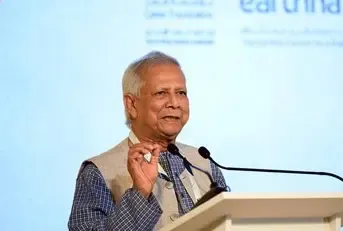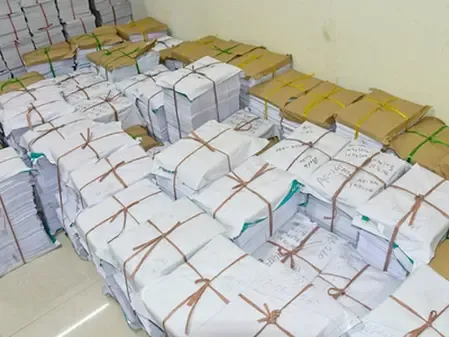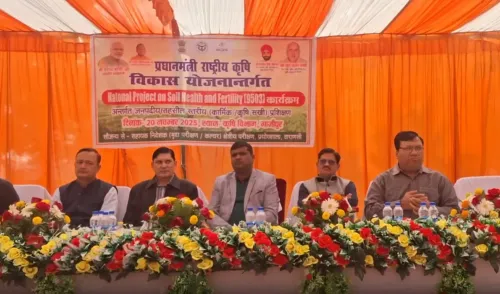Is Pakistan Using Bangladesh as a Proxy in its Strategy Against India?

Synopsis
Key Takeaways
- Bangladesh has become a focal point in Pakistan's strategy against India.
- Interim chief adviser Mohammad Yunus is allegedly supporting terrorist networks.
- Pakistan is focusing its efforts on Jammu and Kashmir through these groups.
- Indian security agencies are enhancing their vigilance in response.
- Several terror organizations have established modules within India.
New Delhi, Oct 4 (NationPress) Once hailed as a rapidly advancing economy, Bangladesh has now transformed into a battleground in a proxy conflict against India.
Similar to Pakistan, the Dhaka government has been engaging in the dissemination of misinformation and constructing a deceptive narrative against India.
With an administration led by interim chief adviser Mohammad Yunus, Indian intelligence agencies assert that Bangladesh now hosts a greater number of terrorist organizations compared to Pakistan.
The terrorist factions originating from Bangladesh have undoubtedly received support from the Inter Services Intelligence (ISI). However, under Yunus, who enjoys backing from the Jamaat-e-Islami, Pakistan has successfully infiltrated and established even more terror groups within the nation.
An official from the Intelligence Bureau remarked that Pakistan's tactics have undergone a significant shift since the removal of former Prime Minister Sheikh Hasina.
By intensifying the establishment of terrorist networks in Bangladesh, Pakistan has made it clear that its primary focus will be on Jammu and Kashmir.
According to UK-based Bangladeshi political activist, Barrister Nijhoom Majumder, Bangladesh has become a frontline in the conflict, with India as its target.
Under Yunus, who labels dissent as fake news, Bangladesh has witnessed 2,500 instances of torture, 30 killings of minorities, and 637 cases of mob violence within the past 14 months.
Following Operation Sindoor, Pakistan's military faced significant exposure.
While Pakistan has misrepresented statistics regarding the casualties from Operation Sindoor, the truth remains that Islamabad recognizes its inability to confront the might of the Indian armed forces.
Consequently, Pakistan has opted to recalibrate its focus solely on Jammu and Kashmir.
Previously, its attention was scattered across various parts of India, as evidenced by the numerous attacks including the Parliament and the Mumbai 26/11 incident.
Under the new strategy, Pakistan aims to cultivate as many terrorist groups as possible in Bangladesh, directing them to target not only the northeastern states but other regions of India as well.
The Jaish-e-Mohammad and Lashkar-e-Toiba are earmarked for operations in Jammu and Kashmir.
Meanwhile, Bangladesh-based terror groups like Jamaat-ul-Mujahideen Bangladesh (JMB), Harkat-ul-Jihadi-Islami (HuJI), Ansaraullah Bangla Team (ABT), Islamic State, and Al-Qaeda have been instructed to target various regions across India.
If these organizations focus their efforts on the northeastern, northern, and southern states, it would allow the Pakistan-based factions to concentrate exclusively on Jammu and Kashmir.
However, even in Jammu and Kashmir, Pakistan is cautious, recognizing that any reckless action, such as the Pahalgam attack, would prompt a severe response.
Pakistan is aware that India considers acts of terror as declarations of war, rather than mere cross-border terrorism.
By directing the Bangladesh-based terror factions to concentrate on the rest of India, Pakistan seeks to overwhelm security agencies, diverting attention and granting itself the opportunity to execute attacks in Jammu and Kashmir.
Indian intelligence agencies are now faced with challenges on two fronts, necessitating heightened alertness.
Firstly, all the terrorist organizations in Bangladesh benefit from the support of the local administration.
Since the Jamaat-e-Islami holds significant influence, these terror groups can operate with state-sanctioned freedom.
Secondly, a majority of these factions have established modules within India.
The JMB has a presence in West Bengal, while the ABT operates in the northeast. The HuJI has established networks in southern India, and Al-Qaeda has its modules in northern India.
Meanwhile, the Islamic State has successfully propagated its ideology in southern India.
This situation implies that these groups can activate their existing networks without starting anew.
However, officials highlight a significant evolution in India's security management.
The intelligence apparatus has strengthened considerably, with agencies like the National Investigation Agency (NIA) making remarkable strides in counter-terror operations.
Though the ISI may devise such strategies, the enhanced security measures in India would pose substantial challenges for these terrorist organizations.
Nonetheless, the persistent threat remains a reality.









